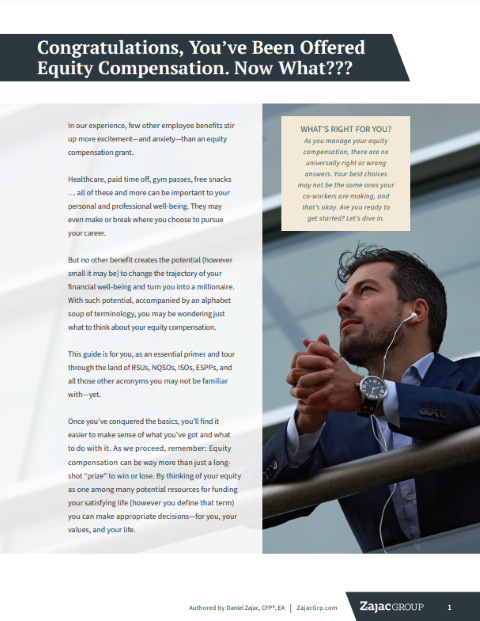Employee Stock Options vs. Restricted Stock Units (RSUs)
It’s gratifying to be invited to participate in your company’s growth through an ownership stake in its future. But of course, not all offers are the same. Here’s a summary to compare the two most common kinds of equity compensation: employee stock options vs. Restricted Stock Units (RSUs).
| Employee Stock Options | Restricted Stock Units (RSUs) | |
| Overview | As the name suggests, employee stock options give you the right, but not the requirement, to buy company stock at a fixed price, known as the strike price (or exercise price). There are two kinds of employee stock options: non-qualified (NQSOs) and incentive stock options (ISOs). You can compare them in more detail here. For either, because you have choices over when, or even if, you’ll exercise your options to buy any stock, you have flexibility over how to manage the process. | RSUs are not options to buy stock shares, they are units promised to you once they vest and are delivered, often as shares of stock. RSUs typically vest automatically over time, and can be an attractive way to participate in your company’s success. However, RSUs are often taxed upon vesting, so watch for your vesting dates and plan accordingly. Also, don’t confuse restricted stock units with restricted stock awards, which are similar, but different. |
| Tax Treatment at Grant | There is no tax impact when you are granted your stock options. | There is no tax impact when you are granted your RSUs. |
| Tax Treatment at Vesting | Stock options are not taxed at vesting unless you also exercise your option to purchase shares of stock at that time. See the next entry for more details. | RSUs are generally taxed when they vest (when your shares are deposited into an account in your name). The full value of the vested units is taxed as ordinary income at that time. |
| Tax Treatment at Exercise | NQSOs: In the year you exercise your options, you’ll pay ordinary income taxes on the difference between the exercise price of the option vs. the fair market value at exercise. You incur this tax whether you exercise and hold, or exercise and sell the stock.
ISOs: Exercising ISOs is not itself a taxable event for figuring ordinary income tax unless there is a subsequent disqualifying disposition. The amount and type of tax you end up paying will depend on how long you hold the exercised shares before selling them. The spread between the exercise price of the option vs. the fair market value at exercise may be an adjustment for calculating the AMT. See the next entry for more details on taxes and AMT adjustments at sale. |
Because RSUs are delivered to you and tax at vest, the notion of exercising your right to purchase the shares does not apply. |
| Tax Treatment at Sale of Stock | It depends on how long you hold the stock before selling it …
NQSOs: You’ll incur a short- or long-term capital gain or loss at final sale, based on the difference between the stock’s final sale price vs. its adjusted cost basis. ISOs: “Qualified” sales are taxed at long term capital asset tax rates; “disqualified” sales likely incur a combination of capital gain and ordinary income tax rates. Each sale type is also subject to different AMT tax treatments. Read more here. |
Once your RSUs have vested and you’ve received your stock shares, they are treated the same as any other capital asset you may own, subject to short-term/long-term capital gain/loss reporting. |
| Tax Withholdings | At exercise: When you exercise NQSOs, income taxes are withheld at statutory rates (usually 22%, or 37% if statutory income exceeds $1 million). No tax is withheld when you exercise ISOs, regardless of whether you do a qualifying or disqualifying sale.
At final sale: No tax is withheld at the final sale for either type of stock option. Estimated tax payments may be in order. |
At exercise: When you receive your vested RSUs, income taxes are withheld at statutory rates (usually 22%, or 37% if statutory income exceeds $1 million). Most companies satisfy the withholding obligation by holding back requisite units, and issuing only the net shares.
At final sale: No tax is withheld at final sale. |
| Cash Flow at Share Transfer | For both NQSOs and ISOs, you may be able to arrange for a cashless exercise or sell to cover. This means using an exercise and sell of shares to cover the cost of the stock purchase, potential tax withholdings, and (for ISOs) potential AMT payments. Careful financial and tax planning is advised. | When your RSUs vest, your company will usually withhold some of your RSU shares to cover some of the anticipated tax bill. However, the withholding may not cover the full tax liability. Estimated tax payments may be in order. |
| 83(b) Treatment | If your options agreement provides for it, you may be eligible to early exercise your option and file an 83(b) election, accelerating the tax impact to occur now as compared to after vesting. If your company is early-stage, with a low share price, you may pay less tax early on, than waiting until the options vest. For NQSOs, 83(b) pertains to ordinary income, and may be advantageous. For ISOs, 83(b) is for figuring AMT. | RSUs are not eligible for 83(b) election (although restricted stock awards may be).
|
| Availability | NQSOs can be granted to employees and others such as contractors, directors, advisors, etc.
ISOs are only available to employees, and up to certain limits. |
RSUs can be granted to employees and others such as contractors, directors, advisors, etc. |
| If You Leave the Company | NQSOs: Exercising remaining options will be subject to the terms in your plan document or option agreement, which may offer a post-termination exercise window or options expiration date.
ISOs: You’ll need to exercise the vested options within 90 days after termination to retain ISO origin. |
You’ll typically forfeit any unvested RSUs. However, some plans allow accelerated vesting in certain situations. Check your plan document for more details. |
| Maximums | There are no limits on NQSO awards. ISO awards are limited to $100,000/year of exercisable value. | There are no limits on RSU awards. |
| Commonalities | As described above, neither employee stock options nor RSUs create a tax event at granting. Both also share similar characteristics with respect to their grant date. And both may expose you to concentration risk, or the risk of having too much wealth concentrated in a single stock. If your concentration risks are too high, you may want to prioritize reducing them over optimizing tax-saving opportunities. For example, even if it’s less tax-efficient, you may more quickly reduce concentration risk by diversifying the proceeds into other assets as soon as possible. | |
We understand this summary may generate as many questions as it resolved. Fortunately, most of these topics are covered in more detail in our articles library; just search on keywords of interest and you’re likely to find a bounty of information. We’ve also got a glossary of terms, in case any of the jargon is confounding you. Or, please be in touch with us anytime for a personalized conversation. Equity compensation is our favorite subject!
This material is intended for informational/educational purposes only and should not be construed as investment, tax, or legal advice, a solicitation, or a recommendation to buy or sell any security or investment product. The information contained herein is taken from sources believed to be reliable, however accuracy or completeness cannot be guaranteed. Please contact your financial, tax, and legal professionals for more information specific to your situation.







0 Comments